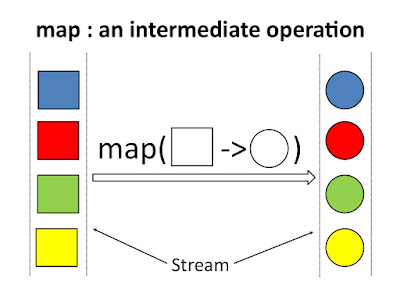有时候我们需要将给定的 List 转换为 Map。
如果你使用的是 Java 8 以后版本的话,Stream 是你的好朋友。

Java 8
public Map<Integer, Animal> convertListAfterJava8(List<Animal> list) {
Map<Integer, Animal> map = list.stream()
.collect(Collectors.toMap(Animal::getId, Function.identity()));
return map;
}
上面的代码可以非常容易的完成转换,我们有一个 Animal 对象的 List。
上面的代码将会把 Id 作为 Key,然后生成的 Map 是以 id 为 Key,Animal 为Value 的 Map。
Guava
如果使用 Guava 就更加简单了。
public Map<Integer, Animal> convertListWithGuava(List<Animal> list) {
Map<Integer, Animal> map = Maps
.uniqueIndex(list, Animal::getId);
return map;
}
使用 Maps 的工具类就可以了,这个工具类可以直接用。
更进一步
如果对需要生成的 Map 进行处理。
Key 是对象中的一个值,Value 是 List 对象中的另外一个值。
例如可以使用下面的代码:
listingStatusList.stream().collect(Collectors.toMap(CListingStatus::getListingStatusKey, CListingStatus::getListingStatus));
其中 CListingStatus 对象是这样定义的。
@Entity
@Getter
@Setter
public class CListingStatus extends AbstractPersistable<Long> {
@ManyToOne
@JoinColumn(name = "rets_id", nullable = false)
private ConfRets confRets;
private String listingStatusKey;
private ListingStatus listingStatus ;
}
对 Map 中的对象设值
针对 Stream 中的对象,我们可能还需要重新设置为其他的对象。
这个时候我们就可以使用 lambda 函数了。
同样的代码:
HashMap<String, Agent> agentHashMap = (HashMap) mlsAgentList.stream().collect(Collectors.toMap(MlsAgent::getMlsAgentId, mlsAgent -> {
Agent agent = new Agent();
agent.setAgentId(mlsAgent.getMlsAgentId());
agent.setAgentNameFirst(mlsAgent.getNameFirst());
agent.setAgentNameLast(mlsAgent.getNameLast());
agent.setAgentEmail(mlsAgent.getEmail());
return agent;
}));
我们返回的 Map 使用了一个新的对象为 Value。
上面针对 Stream 转换为 Map 的方法进行了一些小总结,这些方法可能实际编程的时候使用的频率比较高。
同时能够避免大量使用 For 循环的情况。
Stream 还是需要好好了解下的。
https://www.ossez.com/t/java-list-map/14144
标签:Map,Java,MAP,list,List,agent,map,mlsAgent From: https://www.cnblogs.com/huyuchengus/p/16786532.html